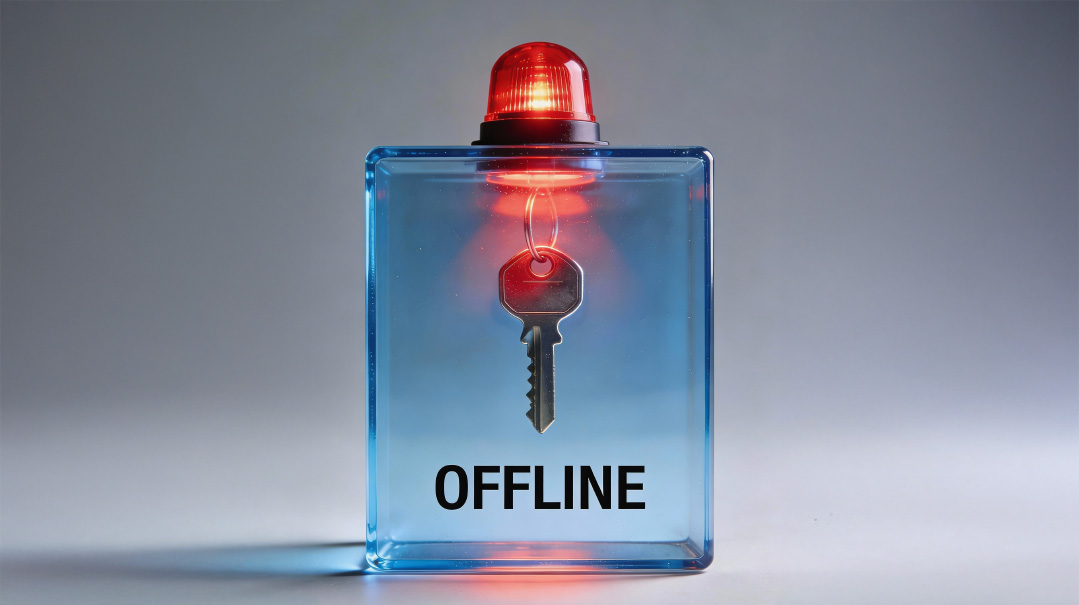Depreciating Assets
| May 4, 2021"When she asked for a raise for one of the young graphic designers on the team, I realized I had to set her straight"

Mr. Shine: Does the staff take for granted that they still have jobs?
Rifka: Our employees need to feel valued in order to keep giving.
Rivka
"Mrs. Lederman?”
When Mr. Shine — known informally on the floor as the Boss, capital B — stepped into my office one morning, I was actually startled enough to spill my coffee.
The Boss never pays a visit to the cubicles of his junior employees — or even to us supervisors, slightly higher on the totem pole. If he wanted to speak to me, I’d get an email to come see him.
“Yes? Good morning, I mean, is everything okay?” I was babbling. Stop, Rifka. Chill. He’s just... well, the boss of this entire company, the one who pays your mortgage every month. I took a deep breath, mustered up a smile.
“Would you like to see where our current projects are holding?”
“We have a new client,” Mr. Shine rumbled, cutting to the chase without responding to my question. “Big client, big, big stuff. Big opportunity. He needs the highest level service and the highest level results. And he needs the job done quickly. We need to put everything else aside as much as possible, and start as soon as he’s given us the details.”
I knew what that meant. Top service, top quality, top speed. That added up to a grand total of migraine-inducing pressure — for me, and for my team.
“When would he like to—”
“He’s coming in now,” Mr. Shine cut in smoothly. “He’ll be meeting with me briefly, then we’ll be heading over to the conference room. Please be there in 15 minutes.”
Fifteen minutes? I checked my schedule — I was supposed to be interviewing a new web designer today to take over Sarah’s maternity leave, and meeting with Chaya Ruchi and Kaila about the Klein project. There were emails to answer and clients to call and — oh, yes, Sobel from Finest Florals needed the print ad today, why hadn’t Hadassah sent it to me?
Forget the new project; I already had a migraine.
One hour into the meeting, my head was pounding and I needed another coffee urgently. We’d gotten through the nitty-gritty of introductions and polite small talk and here’s-what-I’ll-need and lots of note-taking. Mr. Shine wasn’t joking when he said it was a big client. This wasn’t big, this was huge. We hadn’t done a project like this since… well, not since I started here at Media King, that’s for sure.
And then someone mentioned the deadline.
Big Client — I couldn’t for the life of me remember his name, I’d have to check the minutes of the meeting that Raizy, Mr. Shine’s personal secretary, would email — wanted a “fairly quick turnaround time,” those were his words. What did that mean? A week? This was a lot of work.
“How about the 25th?” he proposed, and we all dutifully pulled out our phones to check the calendar. There was a murmur round the table.
I scrolled through the calendar a minute, searching. The 25th… that was in five weeks, wasn’t it? That wasn’t too quick at all… wait a minute.
It took me a moment to register. He was giving us four days.
Four days for a project that my team could comfortably work on for a month.
Four days with no warning ahead of time, no prior research or experience with the company, four days crowded with other commitments and projects and deadlines, Sobel’s ad overdue, and Klein and the curtain company and Michael from IT who hadn’t yet come to fix the glitch with Fraidy’s Internet connection…
I opened my mouth to suggest extending a little, just to make sure the work would be highest quality, but then Mr. Shine caught my eye, across the table. Make him happy, his gimlet gaze commanded.
“The 25th sounds fine,” I blurted.
Then I stumbled back to my office, dropped my head in my hands, and tried to breathe.
We can do this. We can. We’ll do it because we have to.
I didn’t have long to process the news before the chaos of a regular workday descended again.
It was Ayelet, one of our star graphic designers.
“Rifka? Talia from Princess Bridal called. She’s just decided the design palette we settled on doesn’t match the vibe she wants to give over, she’s asking if we can start over, but the print ads were finalized yesterday, and it means redoing the entire package—”
Talia from Princess Bridal was a problem. But Big Client was a bigger one. And Ayelet, I suddenly realized, was the key to our solution.
“I’ll take care of Talia,” I told her. “And I’m passing on the project to one of the others after that, they can deal with it. I have something else for you to work on. Something big.”
Surprise flitted across her face, but she pulled over a chair.
“Sure.”
That’s what I loved about working with Ayelet, Not only was she insanely talented, but she was genuinely nice, super easy-going, and she gave every job her all.
I knew she’d come through for me with this project too, whether it took extra hours or an all-nighter at home. We’d pay overtime, of course, but sometimes I thought even overtime pay wasn’t enough really. She had a husband and kids like the rest of us.
“Four days, whew,” Ayelet said with a low whistle, when I finished explaining the details. I could see the wheels turning in her mind as she figured out her plans. “Look, I can keep my babysitter on an extra two hours today, and I guess my kids will be happy enough to have pizza for a couple nights, I’ll make it work.”
At the door, she flashed me a smile. “Don’t worry, Rifka, we’ll get it done. I’ll start right away. If you let me know who’s doing the copy and the web stuff, I’ll coordinate with them and get it on a Trello board, that’ll make things more efficient.”
“You’re the best, Ayelet. Let me get the other projects out of the way, and I’ll touch base with you in an hour or so.”
Once she was on the job, I could relax. Ayelet wasn’t one to put in her hours and then clock out at 5 p.m. on the dot. It wasn’t the first time she’d saved our necks — the past year had been full of emergencies and last-minute glitches, especially during those crazy months in lockdown.
Honestly, I don’t know how she’d done it. I have four kids myself, but the youngest is already eight. Ayelet has three kids under five at home, her husband works too, and every time I spoke to her on the phone, she managed to sound perfectly calm and upbeat. Her baby cried through the night? No problem, she took a nap and was ready to get back to work an hour later. She designed logos with her toddler on her lap. She did her own job plus another designer’s, when Kaila’s family came down with COVID. I don’t remember her ever saying no to anything I asked her. “I’ll make it work,” was her motto — and she did, without letting the quality of her work slide, even once.
And now, back in the office, she was saving the day again.
Ayelet’s desk was the third cubicle in the row, her desk covered in print-outs with a half-empty salad container to one side, like she didn’t even have time to finish her lunch. (She probably didn’t.) I made a mental note to order in something for supper; she wouldn’t be the only one staying overtime, and I wanted to keep up the morale. The office atmosphere was usually upbeat and friendly, but when a super-pressurizing deadline came up, nerves were on edge, and I didn’t want the tension to get anyone upset. Productivity and a positive atmosphere went hand in hand, and the better the team felt, the better they worked.
As I’d hoped, the Rothman project (Raizy had sent the memo over, and I’d finally gotten the name straight) was coming on nicely. Color themes, design templates, frenetic emails, inter-departmental memos, and the usual chaos of something amazing coming together at top speed, with not a few hitches along the way.
So I was surprised when Ayelet appeared at my office door a while later. I was just about to bite into my lunchtime tuna sandwich, at — I glanced ruefully at the time — close to 5 p.m. What a day.
“Hey, Ayelet. How’s it going?”
“Good, I think.” She had a look in her eye that was the graphic designer’s equivalent of a paint smudge on the cheek, that kind of dazed look that comes after having spent far too many hours squinting at a computer screen. “I’m here for another hour or so. Chaya Ruchi can’t stay, but she’s going to do a couple of hours’ work tonight, she said. Anyway, I just wanted to ask you something, unrelated to this project. Do you have a minute?”
“For you, sure,” I said.
Ayelet played with a strand of her wig, twirling it round her finger. She looked uncomfortable.
“It’s like this,” she said finally. “I don’t know if you remember… it was a while back. Before COVID and everything. We discussed, you know, about possibly getting a raise?”
Money. Of course it was about money.
“I know the company was losing clients in COVID, so obviously, I didn’t ask again,” she continued. “It’s just, now, you know, things are really tight for us, at home I mean, and I’ve been working here a while at a starting salary… I just thought I’d bring it up. I was wondering if you could put in a good word for me.”
I was Ayelet’s supervisor, but I had zero to do with her salary. Still, how could I refuse to put in a good word for an employee who was literally holding the team together?
“I’ll speak to Mr. Shine,” I said, carefully. “Thing is, Ayelet, I know we’re back to work and all that like regular, but I’m pretty sure the management isn’t giving anyone raises just now. Things are still tight, you know how it is… but I’ll definitely say something. If anyone deserves it, you do!”
After she left, I wondered for a while if there was any other way we could show our appreciation, even if a raise was out of the question. Maybe a one-off bonus when this Rothman nightmare would be over. Or even an upgraded office space, maybe a more spacious cubicle. Something to show her we valued all the hard work — and also to give the motivation for her to keep at it. No one, not even Ayelet, could keep on going with zero appreciation.
I mean, I appreciated her, and I told her so countless times. But it was time to put our money where our mouths were, and show her that her hard work was noted and recognized.
I just hoped Mr. Shine would be in agreement.
I waited for the right moment to make the case for Ayelet, and the opportunity came up a day or two later, when I went to report to him on our progress with the Rothman project. The update was good — incredible, even, for a job we had no clue about at the beginning of the week. Mr. Shine looked through the print-outs I offered, grunted his approval, and wanted to know when we were sending the final project to Rothman.
“Hopefully tomorrow, right on time,” I said, a tad defensively, then amended my tone. “I think he’ll be really happy. The team have all been working very hard on this.”
“Yes, yes, good job. I can see that a lot of thought’s been put into this.”
Coming from Mr. Shine, that was a big compliment. I decided to take the plunge.
“Which reminds me… one of our graphic designers, Ayelet Fried? She was actually hoping for a raise a while back. I know things have changed now with COVID and all, but she’s really gone above and beyond for the company this entire year.”
I gave a few examples, hoping I was making her case well enough. Mr. Shine didn’t do gushy-mushy emotion; he did hard, solid facts. I explained how Ayelet had taken on extra jobs at peak stress times, how she was shouldering so much of the Rothman project, how she was constantly overextending, extra hours, extra work.
“She gets paid overtime, doesn’t she?” Mr. Shine interjected, raising one eyebrow.
“Uh, yes, of course she does. But that doesn’t mean it’s easy to stay longer hours at a moment’s notice, make child care arrangements… I really would like to show her how much we value hard work and devotion here at Media King.”
There, that line had the right ring to it.
Mr. Shine gave me a sharp look. What had I said wrong?
“Of course we value hard work. That’s why we pay a salary, including generous overtime pay.” He steepled his fingers. “I don’t think I have to explain to you, Mrs. Lederman, that the company is not in a place to offer raises to anyone right now.”
I’d kind of expected that, but still.
I took a deep breath. Time to try for something, at least.
“I understand that, I really do. That’s why I was thinking, maybe we could offer her something else, a one-off bonus, a small gift from the company — something like that?”
Mr. Shine was already shaking his head before I even finished the sentence. “Look, Mrs. Lederman, I appreciate the idea, it’s nice that you’d like to reward good performance, but I can’t start setting expensive precedents like bonuses and gifts. It’s simply not going to work.”
Just before I left the office, he called after me, “Oh — and I saw a charge from your department, some food ordered in for the employees staying overtime. I know that in the past we would make allowances for such things, but I’d appreciate if you could cut down on the spending there, too.”
It was a good thing I was already halfway out the door.
I was furious.
No raises. No bonuses. No perks. And now, a dressing down for simply treating our overtime, overstressed team to pizza and fries.
He might be thinking of the company’s bottom line, and granted, I had no idea how the financials of the company worked. But I knew people, I knew my team. I knew that boosting morale wasn’t just a nice gesture, it was essential. What if disgruntled employees, feeling the lack of appreciation, would decide to up and leave? What if Ayelet left? Did Mr. Shine realize what it would take to replace her, to replace any of the team we’d built up?
And now, I’d have to find Ayelet, let her know her request was turned down. When she’d likely be pulling another all-nighter tonight. Without even the promise of supper on the house.
If I could tell Mr. Shine one thing, it would be: It’s in our own best interests to show our finest employees how much we value them.
Mr. Shine
We nearly lost the company last April.
Media King is a fairly new company, but baruch Hashem, we’ve seen success over the first few years. We built up an excellent team and a steady stream of loyal clients. The office was buzzing, the team was doing what it did best, and for the most part, the clients were delighted with our work.
When COVID hit, we were a hairsbreadth away from losing it all.
Who had money to spend on marketing agencies when the economy was plummeting into disaster? Who had the headspace for designing logos and ads when the world was shutting down and death stalked ghostly streets?
We lost 90 percent of our clients. Our team disbanded, moved over to remote work. There was no way to keep track of everyone, keep on top of productivity, employee output was plummeting.
And yet early on, and with guidance from my rav, I made the decision not to let anyone go — for as long as I could humanly manage it.
“The highest form of tzedakah is giving a fellow Yid parnassah,” the rav told me over the phone, when I called to ask how to prioritize the company funding: cut everyone’s wages, or let a few people go?
“These employees of yours, they rely on this job, it’s their lifeline. It’s almost Pesach, Reb Menachem, and these are the families who will be turning to the community for kimcha d’pischa, if not for you.”
I heard him, and made a firm resolution: I was going to keep everyone on payroll, even if it meant paying out of pocket if necessary.
It was necessary, for a couple of months. There were some clients, not many, mostly just a few ads here and there, no large accounts. I was paying a team of technicians who pretty much kept their phones on and did nothing.
“You’re crazy,” my brother Yanky told me, flatly. His company dealt with real estate, they’d had to let half their employees go, and he was afraid things would only get worse. “You’re just pushing off the inevitable.”
“If you go on like this, you’ll lose the company,” was my friend Leizer’s take. “I know it doesn’t feel nice, but you gotta let a few people go so that you can continue paying everyone else. No one’s gonna win if you go bankrupt.”
But we didn’t go bankrupt. Somehow, we made it through and business even started picking up again. Not to the extent it had been pre-COVID, granted, but we were actually covering our expenses again, and that was something.
“Pulled through, huh?” Yanky asked me at our extended family Melaveh Malkah one week.
“Mmm,” I said, noncommittal. We were doing okay, true, but it was slow going.
We needed a big client, a big project. Something huge and high-profile that would catapult our agency to the big leagues, and fast.
“Actually, I might have a client for you,” Yanky said vaguely, stirring his ice coffee in a distracted manner. “Rothman, you heard of him? Branching out, he’s opening some new business, all online, I’m sure he’ll be looking to outsource the marketing. I see him in shul sometimes. Nice guy. I’ll put in a good word for you.”
Rothman? Now that was big stuff.
To be honest, I didn’t hold much hope in Yanky’s offer. Why should David Rothman use a fledgling company when he could afford something a lot larger? But then, unbelievably, I got a message one day as I was parking the car outside the office: Are you avail to meet this morning. Re branding and marketing proposal. David Rothman.
We had to make this work. We had to.
David Rothman was not just a client. He was an opportunity, a doorway to the big leagues, the big bucks. We needed him, and we needed clients like him, projects that could pay a month of salaries in one week.
Everything else could be put on hold for a few days. I needed the team mobilized, I needed them focused and present and ready to make David Rothman happy, no matter what.
“You got a nice vibe here, Shine,” he rumbled to me, as we shook hands after the conference room emptied. “The team, the energy. I have a good feeling about this.”
So do I, I thought, but instead all I said aloud was a smooth, “Thank you, yes, our team is fantastic, and I’m sure you’ll be satisfied.”
As soon as he left, I told the secretary to send out another email to all supervisors, stressing that this project was top priority, and I would be personally taking progress reports every morning.
“In fact, make it a meeting, let’s do this properly,” I said, dictating the change in text quickly. “All team supervisors, at a quarter to nine tomorrow. This is a big project, and it’s got to be done perfectly.”
We had a good team. Within a day or two, progress reports were rolling in, the advertising strategy was coming together, David Rothman had given the logo a thumbs-up. But there were a whole lot more to deliver, and it wasn’t surprising to me to hear that many of the team were putting in overtime hours — some in the office, some from home. The remote work infrastructure we’d set up back in March was coming in useful.
Accounting sent in an email, apparently one of the team supervisors was making large orders from the nearby pizza place: supper for overtime staff.
I reviewed the expenditures. They were reasonable-bordering-on-excessive. Pre-COVID I wouldn’t have even bothered with it. But now… yes, we had a large account, and yes, the team was working hard, but we didn’t have spare money to play with. Overtime pay was nothing to sneeze at either.
Approved this time. Shouldn’t happen again, I replied, and made a mental note to ask the secretary to send around an email instructing supervisors to hold off on ordering food for staff unless they had prior permission.
That was when Mrs. Lederman knocked on my door, asking for a few minutes of my time.
Mrs. Lederman had been with us from the company’s beginning, starting out as our first graphic designer, and eventually supervising the entire design department. She was talented, good with clients, and an excellent supervisor. The progress on the Rothman project was impressive.
But.
She clearly had no idea how things were working right now on the financial end. And when she asked for a raise for one of the young graphic designers on the team, I realized I had to set her straight.
We weren’t in a place to give raises. Or bonuses. Or gifts.
Or to splash out on suppers for employees or extra perks.
For goodness’ sake, we were only just climbing out of debt from last year. Did she realize how close she had come to losing her job? That Ayelet was lucky simply to still be on payroll?
“The company is simply not in a place to offer raises to anyone right now,” I told her. “I’m sorry, it’s nice that you want to reward good performance, but these ideas just aren’t going to work.”
“This graphic designer, Ayelet — she’s gone out on a limb for us,” Mrs. Lederman said, a bit defensively. I wondered briefly if she’d promised something to this particular employee. Was that why she was pushing so far? “It’s not about the hours, I know she gets paid, but it’s the pressure, the fact that she’s really stretching herself thin to perform and make things work. I really feel that we need to show her how we value that.”
I raised my hands, palms up. “So show her. Tell her thank you. I can even tell Raizy to send her an email in my name, would that help?”
She pressed her lips together for a long moment. “I was hoping we could show her our appreciation in other ways.”
But that was exactly the problem. We didn’t have the money to throw around.
“It’s just not possible right now,” I told her, a little impatiently. Didn’t she understand that we were doing everything we could, and that she as a supervisor had only a small view of a bigger picture here? “Oh, and Mrs. Lederman — I saw a charge from your department. Some food you ordered in, was it Monday? Tuesday?”
“Both,” she said, warily. She was already half turning toward the door.
“Right, I understand it was for the employees staying overtime. I know we used to make allowances for such things, but I’d appreciate if you could cut down on the spending there, too.”
Mrs. Lederman didn’t look happy when she left.
But honestly, with the kind of year we’d all just been through, I wondered why she had thought to expect otherwise.
If I could tell Mrs. Lederman one thing, it would be: With the financial situation we’re in, simply covering payroll is difficult. It isn’t the time to ask for perks; there are other ways to show appreciation.
(Originally featured in Mishpacha, Issue 859)
Oops! We could not locate your form.













